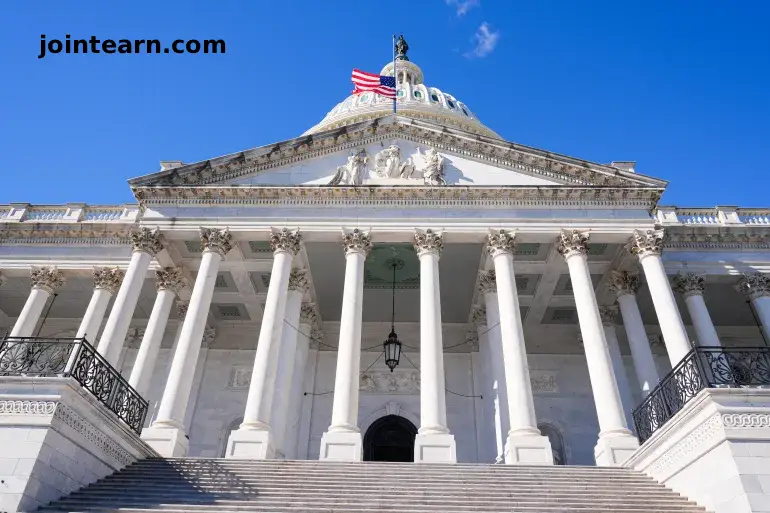
In a dramatic turn of events, eight Democratic senators broke party lines to join Republicans in advancing a critical stopgap funding bill designed to end the longest government shutdown in U.S. history. The procedural vote in the U.S. Senate signals a major step toward reopening federal agencies and restoring government operations nationwide.
Senate Vote Signals Progress on Shutdown
On Sunday, the Senate voted 60-40 in favor of moving forward with the emergency funding package, which would temporarily fund the government through January 30, 2026. The package, supported by bipartisan cooperation, ensures that essential federal services, including food aid programs, veterans’ services, and the legislative branch, remain operational over the next year.
Mike Hanna, reporting from Washington, D.C., explained, “This is a cloture vote, a Senate procedure that allows debate to continue and paves the way for passing bills to end the shutdown. Once passed, all subsequent votes require only a simple majority, making it likely that Republicans, who hold a majority, will succeed in passing the legislation.”
Key Democrats Break Party Lines
The eight Democrats who voted in favor of the funding measure include:
- Dick Durbin (Illinois)
- Jeanne Shaheen (New Hampshire)
- Maggie Hassan (New Hampshire)
- Tim Kaine (Virginia)
- John Fetterman (Pennsylvania)
- Catherine Cortez Masto (Nevada)
- Jacky Rosen (Nevada)
Additionally, Independent Senator Angus King (Maine), who caucuses with the Democrats, also voted yes.
Senate Democratic Leader Chuck Schumer voiced his opposition to the move, stating that Democrats remain committed to protecting healthcare subsidies under the Affordable Care Act (ACA), which are not guaranteed under the current funding deal. “We will not give up the fight,” Schumer declared, emphasizing the party’s continued focus on healthcare and tax credit extensions.
Independent Senator Bernie Sanders and other Democrats criticized the vote as a “horrific mistake,” citing recent elections that underscored public support for firm Democratic positions.
Details of the Funding Package
The bipartisan agreement includes measures from the Senate Appropriations Committee to fund critical programs such as:
- Food aid and SNAP benefits
- Veterans’ programs
- Legislative branch operations
Other federal agencies will receive short-term funding extensions through the end of January, providing lawmakers additional time to finalize broader spending bills.
The agreement also addresses federal workforce concerns:
- Federal workers who received layoff notices will be reinstated
- States reimbursed for emergency spending during the shutdown
- Guarantees that federal employees will receive back pay once the shutdown concludes
- Protections against further workforce reductions through January
Political Fallout and Party Uproar
Political analysts, including Niall Stanage from The Hill, describe the vote as causing an “enormous uproar” within the Democratic Party. Critics argue that the party, fresh off significant electoral victories, lost leverage by allowing the government to reopen without securing guarantees on healthcare subsidies.
Meanwhile, negotiations over ACA healthcare subsidies continue, with a promised Senate vote scheduled for December. House Speaker Mike Johnson has yet to commit to addressing the subsidies in the House, leaving questions about the legislation’s final shape.
Some Republicans have signaled willingness to extend the tax credits to avoid skyrocketing premiums, but they seek to impose new eligibility limits and restructure funding channels. Former President Donald Trump has reiterated his long-standing criticism of the ACA, calling for major reforms or a complete repeal.
Shutdown’s Ongoing Impact on Americans
The shutdown, now over 40 days long, has caused widespread disruption:
- Over 2,000 U.S. flights canceled and 7,000+ delayed, as reported by FlightAware
- Federal workers across the country remain unpaid, prompting emergency food aid initiatives
- The Capital Area Food Bank in Washington, D.C., increased meal distribution by 8 million to support affected residents
- Delays in SNAP benefits have impacted tens of millions of Americans relying on federal food assistance
Treasury Secretary Sean Duffy warned that, without government reopening, air travel ahead of Thanksgiving could “drop to a trickle,” further straining transportation and commerce.
Next Steps for the Legislation
If the Senate passes the amended bill, it will move to the House of Representatives for approval before being sent to President Donald Trump for signature. The process could take several days, but it represents the first major step toward ending a shutdown that has severely affected federal workers, government services, and the U.S. economy.
The political stakes remain high as lawmakers navigate healthcare debates, federal funding priorities, and bipartisan compromise, highlighting the complex dynamics of modern U.S. governance.


Leave a Reply